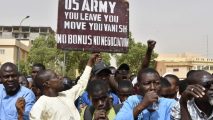Categories
Recent Posts
- Understanding the Biya Francophone regime’s support for the Israeli genocide in Gaza
- US: Prosecution lays out ‘criminal conspiracy’ as Trump’s hush money trial opens
- FAO formally launches Green Cities Initiative in Cameroon
- Football: Barcelona wants Clasico replay if Yamal ‘ghost goal’ call wrong
- Poverty under Biya: Cameroonians embrace Chinese language for brighter futures
Archives
- April 2024
- March 2024
- February 2024
- January 2024
- December 2023
- November 2023
- October 2023
- September 2023
- August 2023
- July 2023
- June 2023
- May 2023
- April 2023
- March 2023
- February 2023
- January 2023
- December 2022
- November 2022
- October 2022
- September 2022
- August 2022
- July 2022
- June 2022
- May 2022
- April 2022
- March 2022
- February 2022
- January 2022
- December 2021
- November 2021
- October 2021
- September 2021
- August 2021
- July 2021
- June 2021
- May 2021
- April 2021
- March 2021
- February 2021
- January 2021
- December 2020
- November 2020
- October 2020
- September 2020
- August 2020
- July 2020
- June 2020
- May 2020
- April 2020
- March 2020
- February 2020
- January 2020
- December 2019
- November 2019
- October 2019
- September 2019
- August 2019
- July 2019
- June 2019
- May 2019
- April 2019
- March 2019
- February 2019
- January 2019
- December 2018
- November 2018
- October 2018
- September 2018
- August 2018
- July 2018
- June 2018
- May 2018
- April 2018
- March 2018
- February 2018
- January 2018
- December 2017
- November 2017
- October 2017
- September 2017
- August 2017
- July 2017
- June 2017
- May 2017
- April 2017
- March 2017
- February 2017
- January 2017
- December 2016
- November 2016
- October 2016
- September 2016
- August 2016
- July 2016
- June 2016
Featured
 Understanding the Biya Francophone regime’s support for the Israeli genocide in Gaza
Understanding the Biya Francophone regime’s support for the Israeli genocide in Gaza  Poverty under Biya: Cameroonians embrace Chinese language for brighter futures
Poverty under Biya: Cameroonians embrace Chinese language for brighter futures  Cameroon is broken: Who can fix it?
Cameroon is broken: Who can fix it?  Ethiopia: U.S Senator Cardin Statement on the Killing of Bate Urgessa
Ethiopia: U.S Senator Cardin Statement on the Killing of Bate Urgessa  Battle for the Unity Palace: ANNOUNCEMENT!
Battle for the Unity Palace: ANNOUNCEMENT!
Most Commented Posts
 4 Anglophone detainees killed in Yaounde
4 Anglophone detainees killed in Yaounde
19 comments Chantal Biya says she will return to Cameroon if General Ivo Yenwo, Martin Belinga Eboutou and Ferdinand Ngoh Ngoh are sacked
Chantal Biya says she will return to Cameroon if General Ivo Yenwo, Martin Belinga Eboutou and Ferdinand Ngoh Ngoh are sacked
13 comments Anglophone Nationalism: Barrister Eyambe says “hidden plans are at work”
Anglophone Nationalism: Barrister Eyambe says “hidden plans are at work”
12 comments The Anglophone Problem – When Facts don’t Lie
The Anglophone Problem – When Facts don’t Lie
12 comments Largest wave of arrest by BIR in Bamenda
Largest wave of arrest by BIR in Bamenda
10 comments
Latest Tweets
Featured
-

Understanding the Biya Francophone regime’s support for the Israeli genocide in Gaza
-

US: Prosecution lays out ‘criminal conspiracy’ as Trump’s hush money trial opens
-

FAO formally launches Green Cities Initiative in Cameroon
-

Football: Barcelona wants Clasico replay if Yamal ‘ghost goal’ call wrong
-

Poverty under Biya: Cameroonians embrace Chinese language for brighter futures
-

US agrees to withdraw troops from key drone base in Niger
-

CPDM Crime Syndicate repays CFA39.8bn debt with new borrowings
© Cameroon Concord News 2024
9, January 2020
Persian Gulf: Trump says Iran ‘standing down’ after missile attack 0
US President Donald Trump on Wednesday said Iran appeared to be “standing down” after missile strikes against Iraqi bases that caused no US casualties, indicating there would be no immediate new military response.
In a televised address to the nation from the White House, Trump emphasized that there were “no Americans harmed” in the salvo of missiles aimed at two bases.
While he promised to immediately impose “punishing” new economic sanctions against Iran, Trump welcomed signs that Iran “appears to be standing down” in the tit-for-tat confrontation, signalling that the United States did not plan a new military riposte.
Trump closed his remarks by addressing Iranians directly, saying that he was “ready to embrace peace with all who seek it”.
However, the US president, facing both an impeachment trial in Congress and a tough re-election in November, touted his decision to order the killing of top Iranian general Qassem Soleimani last Friday – the operation that prompted Tehran’s missile strike.
Soleimani, a national hero in Iran, was “the world’s top terrorist” and “should have been terminated long ago”, Trump said.
Although Trump ended his remarks with the call for peace, he opened by stating bluntly that he would never allow Iran to procure a nuclear weapon.
He then urged European allies and other world powers to follow America’s lead in abandoning a teetering international agreement on managing the country’s nuclear ambitions, and negotiate a new one instead.
Revenge ‘another issue’
Iran’s overnight missile strikes targeted the sprawling Ain al-Asad airbase in western Iraq and a base in Arbil, both housing American and other foreign troops deployed in a US-led coalition fighting the remnants of the Islamic State (IS) group.
Iran’s supreme leader, Ayatollah Ali Khamenei, called the missiles a “slap in the face” for the United States and indicated that more was to come.
“An important incident has happened. The question of revenge is another issue,” Khamenei said in a speech broadcast live on state television.
The office of Iraq’s premier said it had received advance warning from Iran that a missile attack on US forces was imminent.
“Iraq rejects any violation of its sovereignty and attacks on its territory,” the statement said, without specifically condemning the missile strikes.
Iraqi President Barham Saleh denounced the missile attack, warning against attempts to turn Iraq into a “battlefield for warring sides”.
‘Proportionate measures’
The brazenness of the strike was highly unusual for Iran, which has tended to disguise attacks on US interests or troops through its use of proxy Shiite forces.
“Ballistic missiles openly launched from Iran onto American targets is a new phase,” said Phillip Smyth, an expert on Shiite militias.
But as the dust settled, it appeared that Iran’s strike – coming soon after the burial of Soleimani at a funeral in front of vast crowds – might have been more symbolic than anything.
Iran’s Revolutionary Guards Corps warned any US counter-attack would be met with an even “more crushing response” and threatened to strike Israel and America’s “allied governments”.
However, Foreign Minister Mohammad Javad Zarif seemed to indicate that Iran was satisfied for now.
“Iran took and concluded proportionate measures in self-defence,” Zarif said on Twitter.
Sadr calls for restraint
The strikes sparked worldwide condemnation, including from NATO, Germany, France and the UK.
France said its forces deployed in Iraq sustained no casualties while the UK was concerned about “reports” of victims as British troops are stationed there. The Norwegian military said coalition troops were warned of the attack in advance through intelligence channels.
The apparent de-escalation did not remove pressure from approximately 5,200 US troops stationed across Iraq, where Iran has close links to powerful armed Shiite militias.
And Iranian allies in the country said they still intend to take revenge for Friday’s US attack in which top Iraqi paramilitary commander Abu Mahdi al-Muhandis was killed alongside Soleimani.
Paramilitary chief Qais al-Khazali – blacklisted as a “terrorist” by the US – said his side’s response to the United States ” will be no less than the size of the Iranian response.”
Influential Shiite cleric Moqtada al-Sadr said the crisis Iraq was experiencing was “over” following de-escalation rhetoric from both Iran and the US, calling on militia groups not to carry out attacks.
“I call on the Iraqi factions to be deliberate, patient, and not to start military actions, and to shut down the extremist voices of some rogue elements until all political, parliamentary and international methods have been exhausted,” he said.
(FRANCE 24 with AFP)